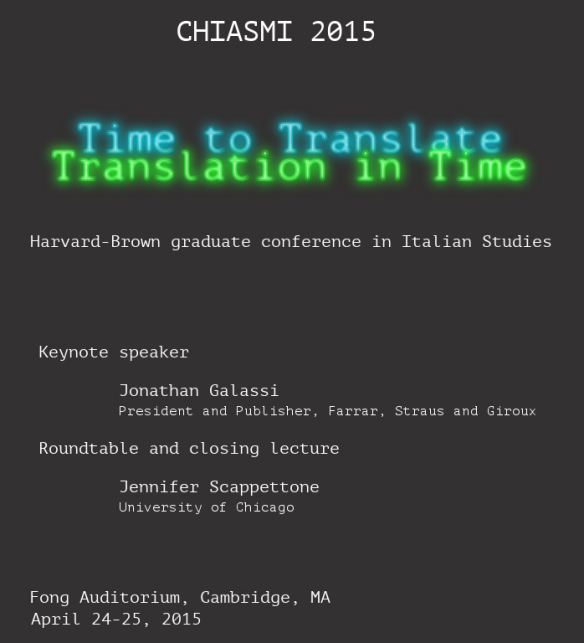TRANSLATION IN TIME
I'm honored to be giving the closing lecture for the CHIASMI conference hosted by the graduate students in Italian Studies at Harvard and Brown Universities next weekend. My talk's title has been altered in tandem with its theme: "Chloris as Translation, and the Dream of a Transhistorical Language." It'll open a final roundtable discussion at 3:30 on Saturday, April 25 at the Fong Auditorium, Boylston Hall – at Harvard University. Harvard University, 24-25 April 2015 (click for full schedule of panels)
Time to Translate ⇔Translation in Time
Keynote speaker: Jonathan Galassi, President and Publisher of Farrar, Straus and Giroux
Roundtable and closing lecture by: Jennifer Scappettone, Associate Professor of English, Creative Writing, and Romance Languages and Literatures at the University of Chicago
Not simply a rewriting, but a new writing, a semantic transference unfurling over the boundaries of diverse cultural contexts, the act of translation has always entailed multiple strata of performative and cognitive processes. What meanings has the concept of translation assumed in different time periods, and how have the tools and aims of translation shifted over time, from antiquity to the present day? On a more microcosmic level, since translation takes place itself in a certain temporal context, in what ways might we gauge the agency, conscious or subconscious, of the particular process? Reflecting on such questions – even in the absence of definitive answers – can provide valuable insight into the practice of Italian Studies, past, present, and future. From the “volgarizzamenti” to the “belle infedeli”; from authorial rewritings to the transformations and adaptations of texts into media not strictly literary (e.g. theatre, art, cinema); to the circulation of classics both within and beyond Italy, the concept of translation, and related practices, appears to be inherently tied to the formation, promotion, and diffusion of Italian language and literature.
Embracing the polysemous nature of the topic, this conference questions, on one hand, the complex role of translation as a discipline through time, and on the other, the inner temporality of the translational process itself. We welcome contributions from various fields (including, but not limited to, literary studies, linguistics, philosophy, art history, film studies, etc.), that engage with the hybrid nature of translation as it relates to Italian culture. Our hope is to establish an interdisciplinary dialogue among the participants and to scale the spectrum of the many possible theoretical and practical approaches to translation.
Topics may include (but are not be limited to):
– “volgarizzamenti” and translations of classics – diachrony and synchrony of / in translation – authorial translations – translation across literary genres or different medias – relationships between authors and translators – poets as translators – examples of multiplied translation – examples of (im)possible translation – writing strategies and devices lying behind translation – intralinguistic translation, or rewording within the same language – Italian greatest hits: translation and circulations on the foreign market – foreign greatest hits in the Italian market – translation as a teaching tool – criticism as a form of translation – new digital tools of translations – translation theories
